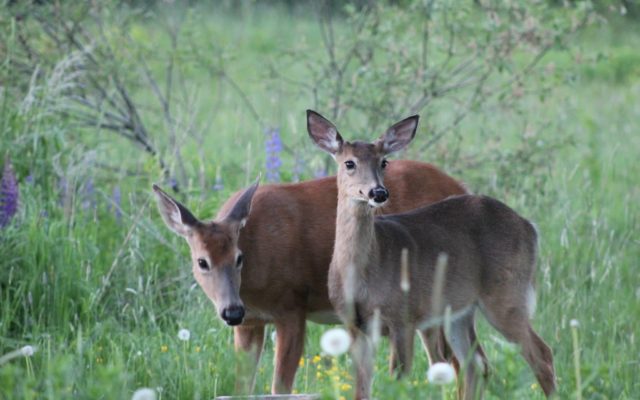
Maine biologists are worried about deer getting COVID — and giving it to each other
By Pete Warner, Bangor Daily News Staff
A new study of white-tailed deer in Iowa suggests many of those animals have active COVID-19 disease, likely contracted it from humans and are spreading it to each other, according to The New York Times.
Scientists are concerned about the possibility of the virus mutating within the deer population and creating a new strain that might be transmitted back to humans.
“Our results suggest that deer have the potential to emerge as a major reservoir host” for the coronavirus, according to the study, which has not yet been peer reviewed.
Scientists at Penn State University, working with the Iowa Department of Natural Resources and Iowa State University, found that among Iowa deer studied between April 2020 and January 2021, nearly 80 percent had detectable levels of COVID-19.
As hunters on Monday began the second full week of the state’s firearms season, the Maine Department of Inland Fisheries and Wildlife said it is not actively studying COVID-19 in deer but is monitoring the studies being done in other states.
“Currently there does not seem to be any evidence that suggests transmission from deer to humans, and the risk to humans appears very low,” said Mark Latti, communications director for DIF&W.
“As always, we continue to suggest that hunters take precautions when processing wild game, such as wearing gloves, and discourage people from feeding wildlife, which can concentrate deer in smaller areas, and ease the transmission of any disease,” Latti said.
Despite the findings, hunters and people who enjoy eating venison are not believed to be at risk.
There is no evidence deer have transmitted the disease back to humans, nor have scientists been able to figure out how the animals got the coronavirus from humans in the first place.
People usually are infected with the coronavirus through the spread of respiratory droplets and COVID-19 has not been found in the deer muscle tissue meat that might be consumed by hunters.
Key members of the group that conducted the Iowa research are worried about the potential implications of such widespread COVID-19 in deer.
“It was effectively showing up in all parts of the state,” Penn State veterinary microbiologist Dr. Kuchipudi told The New York Times. “We were dumbfounded.”
In September, results of a study by the U.S. Department of Agriculture found a high incidence of SARS-CoV-2 (COVID-19) antibodies in deer populations in four states. That indicated exposure to the disease, rather than infection.
That research, conducted on deer in New York, Pennsylvania, Michigan and Illinois, did not test for active COVID-19, nor did it determine how the animals were exposed to the disease, how they were affected by it or whether they could transmit it to humans.
The study suggests that deer populations in other states likely are having a similar issue with COVID-19.
“There is no reason to believe that the same thing isn’t happening in other states where deer are present,” said Penn State microbiologist Dr. Vivek Kapur.
Despite the recent study findings, Iowa wildlife officials, like those in Maine, are urging hunters to take the usual precautions when harvesting a deer.
“To date, there have been no cases of contracting COVID-19 from eating food, including hunted wild meat,” Iowa Department of Natural Resources spokesperson Tammie Krausman told the Des Moines Register.
The USDA study found that approximately 33 percent of deer were carrying coronavirus antibodies.
“There is no evidence that animals, including deer, are playing a significant role in the spread of SARS-CoV-2 to people,” the USDA said. “Based on the available information, the risk of animals spreading COVID-19 to people is low.”
The Iowa study was done on samples of lymph nodes from 283 deer that were harvested at game farms, killed by hunters or hit by vehicles.